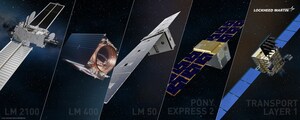DENVER, June 30, 2020 /PRNewswire/ -- After a successful launch this afternoon, the third Lockheed Martin (NYSE: LMT)-built GPS III satellite is now headed to orbit under its own propulsion. The satellite has separated from its rocket and is using onboard power to climb to its operational orbit, approximately 12,550 miles above the Earth.
GPS III Space Vehicle 03 (GPS III SV03) is responding to commands from U.S. Space Force and Lockheed Martin engineers in the Launch & Checkout Center at the company's Denver facility. There, they declared rocket booster separation and satellite control about 90 minutes after the satellite's 4:10 p.m. EST launch aboard a SpaceX Falcon 9 rocket from Cape Canaveral Air Force Station, Florida.
"In the coming days, GPS III SV03's onboard liquid apogee engines will continue to propel the satellite towards its operational orbit," said Tonya Ladwig, Lockheed Martin's Acting Vice President for Navigation Systems. "Once it arrives, we'll send the satellite commands to deploy its solar arrays and antennas, and prepare the satellite for handover to Space Operations Command."
After on-orbit testing, GPS III SV03 is expected to join the GPS constellation – including GPS III SV01 and SV02, which were declared operational in January and April – in providing positioning, navigation and timing signals for more than four billion military, civil and commercial users.
Lockheed Martin designed GPS III to help the Space Force modernize the GPS constellation with new technology and capabilities. The new GPS IIIs provide three times better accuracy and up to eight times improved anti-jamming capabilities over any previous GPS satellite. They also offer a new L1C civil signal, which is compatible with other international global navigation satellite systems, like Europe's Galileo, to improve civilian user connectivity.
GPS III also continues the Space Force's plan to field M-Code, a more-secure, harder-to-jam and spoof GPS signal for our military forces. GPS III SV03 brings the number of M-Code enabled satellites to 22 in the 31-satellite GPS constellation.
"As a nation, we use GPS signals every day -- they time-stamp all our financial transactions, they make aviation safe, they make precision farming possible, and so much more. GPS has become a critical part of our national infrastructure. In fact, the U.S. economic benefit of GPS is estimated to be over $300 billion per year and $1.4 trillion since its inception," added Ladwig. "Continued investment in modernizing GPS – updating technology, improving its capabilities – is well worth it."
Lockheed Martin is proud to be a part of the GPS III team led by the Space Production Corps Medium Earth Orbit Division, at the Space Force's Space and Missile Systems Center, Los Angeles Air Force Base. The GPS Operational Control Segment sustainment is managed by the Enterprise Corps, GPS Sustainment Division at Peterson Air Force Base. The 2nd Space Operations Squadron, at Schriever Air Force Base, manages and operates the GPS constellation for both civil and military users.
For additional GPS III information, photos and video visit: www.lockheedmartin.com/gps.
About Lockheed Martin
Headquartered in Bethesda, Maryland, Lockheed Martin is a global security and aerospace company that employs approximately 110,000 people worldwide and is principally engaged in the research, design, development, manufacture, integration and sustainment of advanced technology systems, products and services.
SOURCE Lockheed Martin

Related Links
WANT YOUR COMPANY'S NEWS FEATURED ON PRNEWSWIRE.COM?
Newsrooms &
Influencers
Digital Media
Outlets
Journalists
Opted In





Share this article